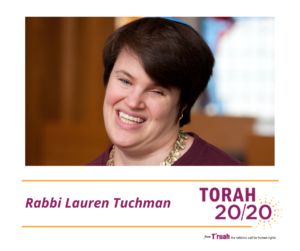Throughout the centuries, our commentators have puzzled over the opening of this week’s parshah. Why, they ask, is our parshah called Chayei Sarah—the life of Sarah—when it opens by recording Sarah’s death at the age of 127? What meaning are we to draw from this juxtaposition?
The Piaseczna Rebbe, Kalonymus Kalman Shapira, also known as the Esh Kodesh (Holy Fire) after his famous book of teachings written in the Warsaw Ghetto from 1939-1942, addresses the question of theodicy in his poignantly beautiful teaching on Parashat Chayei Sarah in 1939. Written shortly after the tragic deaths of several family members, the Piaseczna focuses on Sarah’s suffering and her death after hearing of Yitzchak’s near sacrifice. The heartbreak was so tremendous that her soul flew out of her body. With references to numerous commentators, the Piaseczna’s teaching boldly and powerfully opens up important spiritual and existential questions that emerge in the wake of unfathomable suffering. Sarah’s righteousness, for the Piaseczna, is a given, and if even she reached a breaking point, a crisis moment that resulted in her death, all the more so do the rest of us. The Piaseczna points out the importance of the juxtaposition in the Torah of the Binding of Isaac and Sarah’s death. Sarah’s death is an anguished cry to God: Why has this unfathomable suffering occurred? Sarah cannot bear it; it is all too much. She does not, can not survive it. In other words, the Piaseczna, speaking to Jews in the Warsaw Ghetto, is powerfully teaching that it is perfectly normal for the sufferings of life to be simply unbearable, to be in a space of such a profound feeling of absence and lack. Spiritual explanations make no sense and fall flat. Where can comfort possibly be found in such a state?
Sign up to receive Torah 20/20 in your inbox each week.
The Piaseczna is encouraging, and perhaps even giving permission to, his Hasidim to confront God and ask why the Jews in Poland were enduring such unfathomable sufferings. Part of that work is allowing all of the feelings that are arising to be fully felt, even when a person might feel compelled to push them away or grasp at shreds of spiritual explanations that were once comforting and now ring hollow. Sarah did not passively endure her suffering. Why should any of us?
I find tremendous resonance in this teaching in these times. The Piaseczna is here offering a powerful antidote to the numbness that can overtake us at times of great personal or collective destabilization. The Piaseczna lived a life of deep spiritual discipline and contemplation. In his teachings, he repeatedly emphasizes the importance of feeling one’s feelings to be a well-rounded person. Emotions, from joy to sorrow, are all keys to the soul, inviting us to have a deeper relationship with the Divine Presence. Every emotion we feel is communicating something to us, and it is up to us to listen. Just as Sarah’s anguish was so great that it resulted in her death, many of us are living with tremendous spiritual anguish of our own. For many of us, the world in which we thought we lived has been ripped out from under us, leaving us unmoored. Perhaps we feel powerless to change the larger systems and structures that seem to have so much power over the lives of our neighbors and all of those who are vulnerable in America. Sometimes, we might despair of people in our own families and communities understanding or empathizing with our distress. For those of us who are also facing personal tragedy, the enormity of it all may simply be too great, as if our circuitry simply is incapable of taking any more pain.
Find more commentaries on Parshat Chayei Sara
It would be so much easier to succumb to the numbness and despair that is taking hold of more of us every day. The Piaseczna’s powerful rejoinder to this impulse demands much of us, because he knows—and we know—that to feel is to remain hopeful, to believe in the possibility of a future that is better than our  challenging present. Our culture does not think kindly of those who spend time with their emotions in all of their rawness and vulnerability. The Piaseczna encourages us to do this as the foundation of an authentic spiritual practice, out of an understanding that emotions that are not felt and worked with and through will emerge in unhealthy ways down the line. The Piaseczna understood that this work could not be done alone or even in chavruta but had to occur within the brave space of a small, dedicated community. As we continue to navigate how we might work for justice in our world, may we find those brave spaces. May we find the courage to voice our deepest anguish, never ceasing in our protestations and pushbacks. When we feel emotionally stuck and overwhelmed, may we remember that we can make choices every day, no matter how small or seemingly inconsequential, that can and do have an impact upon our present world and demonstrate our hope for a better, more abundant world for us all.
challenging present. Our culture does not think kindly of those who spend time with their emotions in all of their rawness and vulnerability. The Piaseczna encourages us to do this as the foundation of an authentic spiritual practice, out of an understanding that emotions that are not felt and worked with and through will emerge in unhealthy ways down the line. The Piaseczna understood that this work could not be done alone or even in chavruta but had to occur within the brave space of a small, dedicated community. As we continue to navigate how we might work for justice in our world, may we find those brave spaces. May we find the courage to voice our deepest anguish, never ceasing in our protestations and pushbacks. When we feel emotionally stuck and overwhelmed, may we remember that we can make choices every day, no matter how small or seemingly inconsequential, that can and do have an impact upon our present world and demonstrate our hope for a better, more abundant world for us all.
Rabbi Lauren Tuchman was ordained in 2018 by the Jewish Theological Seminary and is an educator and consultant based in the Washington, DC area.


